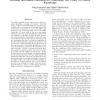Free Online Productivity Tools
i2Speak
i2Symbol
i2OCR
iTex2Img
iWeb2Print
iWeb2Shot
i2Type
iPdf2Split
iPdf2Merge
i2Bopomofo
i2Arabic
i2Style
i2Image
i2PDF
iLatex2Rtf
Sci2ools
132
click to vote
AAAI
1998
1998
Learning Investment Functions for Controlling the Utility of Control Knowledge
The utility problem occurs when the cost of the acquired knowledge outweighs its bene ts. When the learner acquires control knowledge for speeding up a problem solver, the bene t is the speedup gained due to the better control, and the cost is the added time required by the control procedure due to the added knowledge. Previous work in this area was mainly concerned with the costs of matching control rules. The solutions to this kind of utility problem involved some kind of selection mechanism to reduce the number of control rules. In this work we deal with a control mechanism that carry very high cost regardless of the particular knowledge acquired. We propose to use in such cases explicit reasoning about the economy of the control process. The solution includes three steps. First, the control procedure must be converted to anytime procedure. Second, a resource-investment function should be acquired to learn the expected return in speedup time for additional control time. Third, the ...
Related Content
| Added | 01 Nov 2010 |
| Updated | 01 Nov 2010 |
| Type | Conference |
| Year | 1998 |
| Where | AAAI |
| Authors | Oleg Ledeniov, Shaul Markovitch |
Comments (0)

